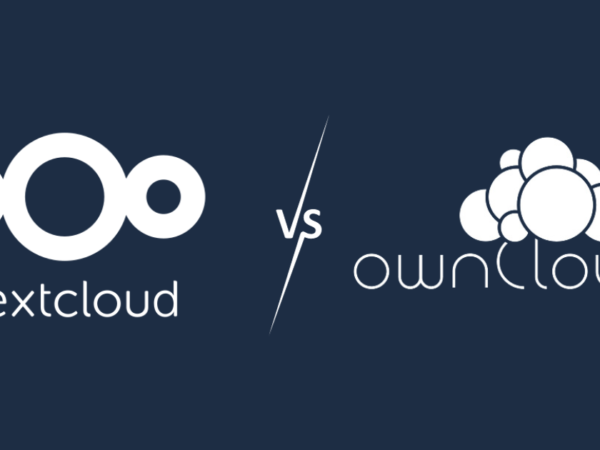<img alt="Self-Hosted Open Source Web Analytics Platforms" data- data-src="https://kirelos.com/wp-content/uploads/2023/08/echo/Self-Hosted-Open-Source-Web-Analytics-Platforms.jpg/w=800" data- decoding="async" height="420" src="data:image/svg xml,” width=”800″>
You are a personal brand or a business with a website that details everything about it—your vision, services or products offered, and more. You have a website with the best Search Engine Optimization practices and unique content. But how do you ensure that you’re business or brand is reaching its audience?
You need web analytics. Now, when I say web analytics, the first thing that comes to mind is Google Analytics. Unfortunately, Google discontinued Universal Analytics in July 2023. There is an alternative to it, Google Analytics 4 (GA4), but it might not suit everyone.
That is why we have curated this list of alternatives to Google Analytics. Moreover, the platforms on our list are self-hosted, open-source solutions. As you read on, you will learn about web analytics, their purpose, and why you need them.
You will also get to know how self-hosted analytics platforms differ from regular web analytics platforms and why you should choose the former. So let’s get started!
What is Web Analytics?
Web analytics means understanding trends through the systematic analysis of online and offline patterns. Its primary goal is to provide data-driven insights into user behavior to improve your website’s functionality and user experience.
Here are some of the questions that web analytics can answer:
- What is the number of visitors to your website, and where are they located? – Learn more about visitor demographics and their sources to better adapt content to their needs and improve channel effectiveness.
- Which specific pages of your website are they looking at? – Increase customer acquisition, enhance the user experience, and analyze user behavior to increase conversion rates.
- How much time do they spend on your important pages? – Use this information to inform your content and interaction efforts.
- What proportion of these visitors exit after viewing just one page? – Discover user preferences by keeping track of page views and time spent, which enables the design of strategic content.
This thorough process comprises gathering, measuring, reporting, and analyzing data from websites to assess performance and maximize utilization. Analytical tools are primarily used to support informed decision-making. You can use data to evaluate an idea’s potential when it occurs to you.
Will it impact a sizable number of visitors or only a select few? Data helps determine the effectiveness of improvements after they have been made.
Self-Hosted vs. Regular Web Analytics Platforms
Off-site and on-site web analytics are the two main subcategories of web analytics.
| Aspect | Self-Hosted Web Analytics | Regular Web Analytics Platforms |
|---|---|---|
| Data Ownership and Control | You have full control over the data and where it’s stored. | Data is stored on the platform’s servers. Limited control. |
| Data Privacy | Generally, better privacy control, as data remains within your infrastructure. | Privacy policies are determined by the platform provider. |
| Setup and Maintenance | Requires setup, updates, and maintenance on your own servers. | No setup is required; it is managed by the platform provider. |
| Customization | Highly customizable to suit specific needs. | Customization options may be limited to the provided features. |
| Security | It depends on your own server security measures. | The platform provider handles security; and varying levels of trust. |
| Initial Cost | Often involves higher initial costs for server setup. | Lower initial costs, subscription-based model. |
| Scalability | Limited by your server’s capacity. | Can handle large-scale websites and traffic easily. |
| Features and Updates | Dependent on the software you choose. | Regular updates and new features from the platform provider. |
| Technical Expertise | Requires technical knowledge for setup and troubleshooting. | User-friendly interfaces; minimal technical expertise is needed. |
| Data Insights | Raw data access for in-depth analysis. | Visualized reports and insights were provided. |
| Latency | It can be faster as data is processed locally. | Slight delay due to data transmission to external servers. |
| Integration with Other Tools | It can be customized to integrate with your existing tools. | Built-in integrations and APIs for various tools. |
| Backup and Recovery | It is your responsibility to implement backup and recovery. | The platform provider typically ensures backup and recovery. |
| Accessibility | Accessible as long as your servers are up. | Requires an internet connection to access the platform. |
| Support | Dependent on your own resources or community support. | Customer support is provided by the platform provider. |
| Regulatory Compliance | You have direct control over compliance measures. | The platform provider states its compliance as a shared responsibility. |
Your decision ultimately comes down to your priorities. Self-hosting could be your savior if data management, customization, and compliance are essential. On the other hand, if simplicity of use, speedy setup, and sophisticated features are your thing, standard platforms might be your best bet.
Now, let’s explore the best self-hosted open-source web analytics platforms.
Umami
One of the best alternatives to Google Analytics, Umami offers a privacy-focused open-source web analytics solution that emphasizes ethical insights and does not compromise user privacy, adhering to General Data Protection Regulation (GDPR) guidelines without using cookies or personal data.
Through its user-friendly interface, you can enjoy hassle-free real-time analytics, and an active open-source community powers its versatility and unlimited website tracking.
Umami guarantees mobile accessibility and is unaffected by ad blockers thanks to its small 2KB script. Sharing insights via unique URLs and a sleek dark mode adds a stylish touch. With GitHub, Discord, and Twitter channels promoting collaboration, the community aspect is significant.
Umami Cloud’s pricing caters to various needs, ranging from free Hobby plans to Pro options (starting at $9/month) and customizable Enterprise solutions. Embrace analytics with integrity through Umami’s community-backed reliability.
Fathom Analytics
Fathom Analytics is “the Google alternative without compromise.” The platform is popular for two reasons:
- encrypting visitor data and complying with GDPR, CCPA, and PECR, and
- simple analytics to access all the information on a single dashboard supported by scalable technology.
Fathom protects user privacy, unlike Google Analytics, by doing away with obtrusive cookies and cookie banners. Its user-friendly dashboard offers current information for making wise judgments. Moreover, any concerns about digital privacy are efficiently addressed by GDPR compliance and a privacy-focused business.
Fathom’s standout features are transparent business practices, extended data retention, and an impeccable reputation. It combines simplicity with deep insights.
Furthermore, the pricing is reasonable, starting at $14 per month, and the lengthy trial period further adds to the allure. Fathom is the best option for dependable analytics that truly respect privacy.
Plausible Analytics
If you’re tired of getting lost in the complex world of technologies like Google Analytics, the solution is Plausible Analytics. This user-friendly solution provides critical insights without requiring a high learning curve. With Plausible, integration with other platforms, such as Squarespace and WordPress, is simple and syncs easily.
You can stay on top with Email and Slack reports and the extensive API that offers data versatility. If you are concerned about data privacy, be assured that Plausible offers complete ownership by providing reliable statistics via first-party scripts.
You can try the platform with a 30-day free trial, and the pricing after the trial begins at just $9 per month. Plausible allows you to seize control of your data and regain your peace of mind with the simplicity of analytics.
Open Web Analytics
The key benefits of opting for Open Web Analytics (OWA) are the direct control and customizability it offers. Hosting it under your domain gives you unmatched authority, while customization enhances capabilities.
With no compromise on privacy, OWA mixes simplicity and functionality with its user-friendly UI and comprehensive API. It has reshaped the landscape by advocating accountable, transparent analytics.
OWA breaks open-source traditions by incorporating complex capabilities such as dashboard monitoring, heatmaps, clickstream analysis, and custom site action tracking. It shows a nuanced grasp of user behavior while optimizing SEO methods and delving into visitor loyalty. The ability of OWA to track interactions with DOM elements demonstrates its complete approach.
Moreover, its first-party control, compatibility with numerous platforms and multiple content management systems such as WordPress and MediaWiki, detailed metrics, and privacy adherence increase its usability by spanning a wide range of use cases.
Matomo
With a customer base covering over a million websites in over 190 countries, Matomo is a reliable open-source alternative to Google. It is trusted by renowned organizations such as the United Nations, Ahrefs, and even NASA to protect its customers’ privacy. The European Commission chose this platform, proving its data integrity skills.
One distinctive aspect of this platform is the Google Analytics Importer, which enables the seamless transfer of historical Google Analytics data. Matomo can safely track personal data while complying with privacy standards.
The platform’s reporting accuracy originates from its lack of data sampling, which provides consumers with 100% precise information. Its open-source nature reduces risks and provides users with a transparent, extensively tested platform.
Also, Matomo has no data constraints, allowing customers to manage unlimited websites, users, and data segments. The user-friendly interface makes it easy to retrieve data, and the wide feature set delivers meaningful insights into client behavior. The versatility of Matomo allows customers to alter and extend the platform to meet individual requirements.
GoatCounter
GoatCounter’s most significant feature is its minimal weight and efficiency. It reduces any performance impact by adding only about 3.5KB of data to a website. Furthermore, this open-source web analytics solution provides a variety of integration options.
It offers a JavaScript-based tracking pixel for easy integration into webpages, but it also supports a JavaScript-free method for situations where JavaScript usage is restricted. This adaptability extends to backend middleware integration and log file parsing, enabling adaptability to various technical requirements.
GoatCounter will appeal to open-source fans owing to its commitment to openness. The platform’s code is available for inspection, allowing users to better understand how it works and even contribute to its development. This is consistent with the platform’s idea of giving people the ability to “own their data.” This implies that consumers can export their data and stop the service anytime, giving them complete control over their data.
Furthermore, GoatCounter’s availability as a hosted service or a self-hosted application allows deployment flexibility based on user preferences and requirements. While it is free with donation-based support, the ability to self-host makes it appropriate for more advanced and large-scale applications.
Countly
Countly is a complete analytics tool that assists organizations in gaining deep insights into their goods and user activity. It enables businesses to extract useful information from the massive amounts of data created by their apps, allowing them to make educated decisions and optimize their strategy.
The platform emphasizes the concept of making every data point count, guaranteeing that no piece of data is overlooked or ignored.
Countly’s capacity to collect data from various sources is one of its primary characteristics. It can collect data from mobile, web, desktop, smart TV, wristwatch, IoT, and set-top box applications using over ten software development kits (SDKs).
Businesses may track customer journeys across several platforms, including iOS and Android for mobile, macOS, Windows, and Linux for desktop, and JavaScript-based tracking for websites and online applications.
Countly is available in two main editions: Community and Enterprise. The Community Edition is open-source, customizable, and suited for small and medium-sized organizations. It allows self-hosting, aggregated data analysis, and analytics on the main platforms, including the web, mobile, and desktop.
The Enterprise Edition, on the other hand, improves capabilities through additional features and scalability. It can be self-hosted or hosted by Countly (a private cloud).
Ackee
Ackee is a self-hosted analytics tool for people who value privacy while monitoring website traffic and performance. Ackee, which is built on Node.js, runs on your own server, giving you complete control over your data.
It has a simple and clean interface displays useful statistics, allowing you to track without being tracked. Ackee ensures user anonymity while offering meaningful data because it is cookie-free and secure. Unlike traditional analytics solutions that may violate user privacy, Ackee’s multi-step anonymization procedure assures your users remain anonymous.
Another advantage of Ackee is its ease of use. Its elegant user interface provides a simple yet comprehensive overview of your website’s performance, saving you from becoming bogged down in complex charts and filters.
Views, referrers, visit durations, languages, screen dimensions, display colors, operating systems, browsers, and devices are among the features provided by the tool. This variety of data allows you to acquire comprehensive knowledge of how your websites are doing.
Integrating Ackee into your websites is as simple as inserting a tracking script for Google Analytics. As it supports infinite domains, you can examine as many websites or apps as you require. Furthermore, Ackee’s GraphQL API allows you to collect data centrally or create your own interface and services around it.
Offen
Offen Fair Web Analytics addresses the ethical challenges that have long plagued standard web analytics solutions. It provides a novel option in an era where user privacy is vital.
Together with the NLnet Foundation’s Next Generation Internet initiative, Offen is ready to transform the analytics environment and foster justice, privacy, and informed decision-making by filling holes left by existing tools.
With its lightweight, open-source nature, it enables website operators to gather information responsibly and transparently, thereby promoting stronger user-digital platform interactions.
Offen’s “opt-in only” data collection technique is a key distinguishing feature. Users must actively consent to data collection in order to ensure ethical data practices. They can also access their own data, making analytics a collaborative rather than a one-sided process. Offen also offers simple localization, with versions available in several languages, increasing its accessibility and reach.
Because the platform’s core is open source, users have total visibility into its operations and can be confident that their data is being handled appropriately. Offen also uses end-to-end encryption to protect user data and prevent illegal access.
It adheres to GDPR requirements by avoiding third-party engagement and intrusive advertisements, assuaging fears about data leakage.
Why Choose A Self-Hosted Web Analytics Platform?
A self-hosted online analytics platform satisfies key data control requirements, particularly privacy and ownership. Control over sensitive information is improved by on-site hosting.
Another advantage of customization is that it enables customized analytics to meet business requirements. As opposed to rigid traditional platforms, this is adaptable. A retail organization, for instance, can thoroughly examine customer interactions and get insights tailored to their particular structure.
It also helps with compliance in sectors with strong rules, such as healthcare and banking. For a financial institution that manages sensitive customer data to increase security and maintain client confidence, self-hosting is the best option. They may adhere to standards while still maintaining data control, thanks to this approach. Security is also essential, and self-hosting enables firms to put strong safeguards in place, bolstering security against breaches.
Economics plays a role as well. Self-hosting can be more expensive initially, but in the long run, especially for data scalability, it may be more cost-effective. Early investments in self-hosted analytics may be significant for a rapidly expanding e-commerce firm, but no additional expenditures per user or piece of data as it scales can result in significant savings.
It also enables businesses with in-house technological competence to create solutions specifically tailored to their requirements. This can entail creating original reporting dashboards or integrating analytics with existing systems.
A software company could, for instance, use its internal IT team to create a self-hosted analytics platform. This platform would deliver real-time user behavior information for continual improvement and integrate smoothly with its product development cycle.
Final Words
There are numerous potent tools available in the field of self-hosted open-source web analytics platforms that offer essential insights while keeping data under control. Each platform meets specific demands, whether it is through the robustness of Matomo, the adaptability of Plausible, or the extensibility of Countly.
These solutions provide open and user-centric analytics techniques for privacy, customization, and data ownership. It is important to evaluate technological requirements, data sensitivity, and analytical objectives when selecting a platform.
Users who choose self-hosted open-source solutions maintain data sovereignty in our interconnected digital environment while also improving online speed.
Next, check out the best self-hosted social networking community software.



